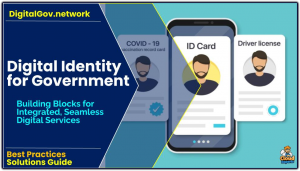Keir Starmer Announces Requirement for Compulsory Digital Identity
The scheme requires all working adults in the UK to obtain a free government-issued digital ID to verify their right to live and work in the country.
 On September 26 UK Prime Minister Keir Starmer officially announced plans for a compulsory digital ID scheme, dubbed the “Brit card,” during a speech at the Global Progress Action Summit in London.
On September 26 UK Prime Minister Keir Starmer officially announced plans for a compulsory digital ID scheme, dubbed the “Brit card,” during a speech at the Global Progress Action Summit in London.
The scheme requires all working adults in the UK to obtain a free government-issued digital ID to verify their right to live and work in the country, aiming to combat illegal immigration and exploitation of undocumented workers.
Starmer emphasized that “you will not be able to work in the United Kingdom if you do not have a digital ID—it’s as simple as that,” framing it as a tool to secure borders and reduce the appeal of the UK to illegal migrants.
Key Details of the Plan
- Scope and Implementation: The digital ID will be mandatory for employment checks, integrating with existing systems like right-to-work and right-to-rent verifications. It is set to be rolled out by the end of the current parliamentary term (around 2029), alongside a planned digital driving license. A public consultation will address accessibility for vulnerable groups, such as the elderly or homeless individuals without smartphones.
- Rationale: Starmer argued that relying on migrant labor to fill workforce gaps is “not compassionate left-wing politics,” as it exploits foreign workers and undercuts fair wages. The government cites reports from think tanks like the Tony Blair Institute and Labour Together, which suggest digital IDs can close loopholes exploited by traffickers and employers, thereby reducing small boat crossings and illegal working.
- Enforcement and Accessibility: Individuals won’t be required to carry or produce the ID in daily life, but it will be essential for job applications and employer checks. The government emphasizes it will be free and aims to prevent illegal hiring without creating a physical card system.
Reactions and Controversies
The proposal has ignited fierce debate, particularly over privacy and civil liberties:
- Opposition: Civil liberties groups, including Liberty and Big Brother Watch, have launched petitions with over 100,000 signatures, warning that mandatory IDs could drive unauthorized migrants “further into the shadows” and erode freedoms. Former Conservative minister David Davis called it “profoundly dangerous to privacy,” while Reform UK leader Nigel Farage vowed firm opposition.
- Support: Proponents, including the Tony Blair Institute, hail it as a “gateway to government services” that could streamline access to benefits, voting, and reporting issues like potholes. Labour-affiliated groups argue it aligns with modern digital norms, noting that people already carry multiple forms of digital ID.
Conclusion
This revives a controversial idea from Tony Blair’s era, which was abandoned in 2010 due to privacy concerns and public opposition. The announcement comes amid high net migration levels and pressure on Starmer’s Labour government to demonstrate border control, especially after over 50,000 small boat arrivals since they took office. It aligns with modern digital trends, as many people already use various forms of digital identification.
The plan requires legislation and further consultation, but it has already become a flashpoint in UK politics, dividing opinions on immigration control versus personal freedoms.




